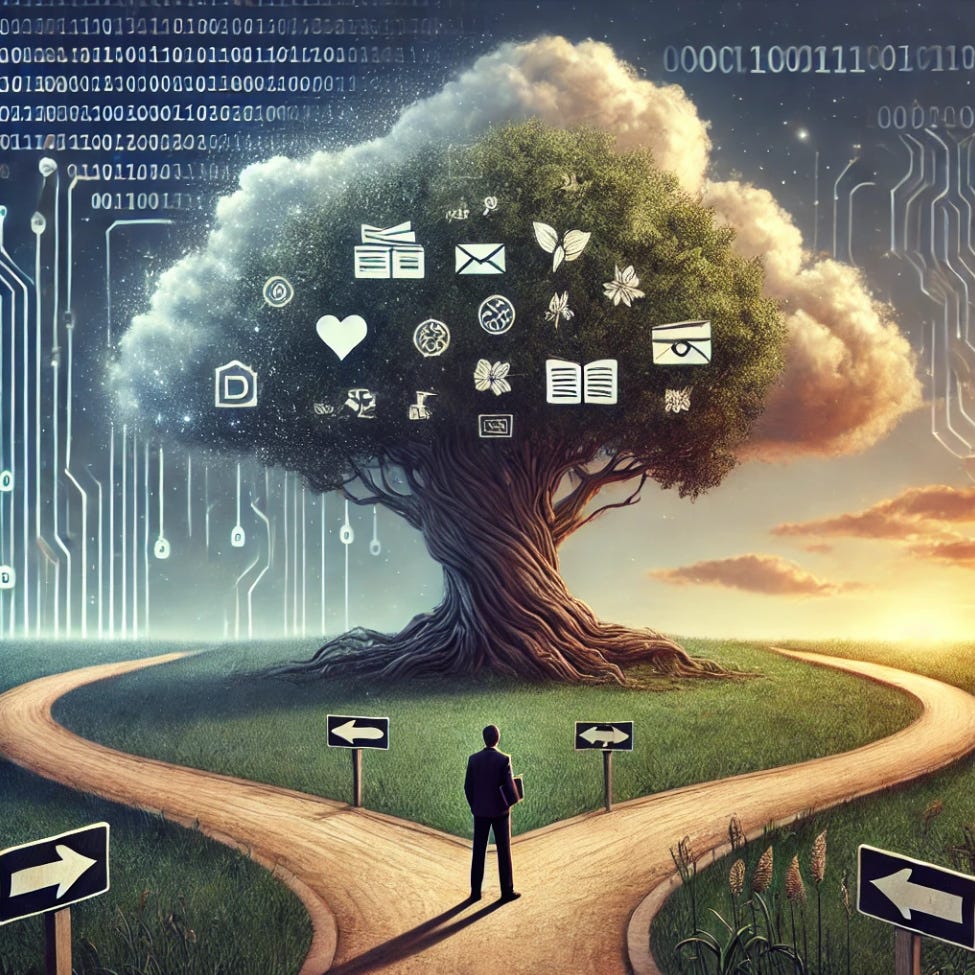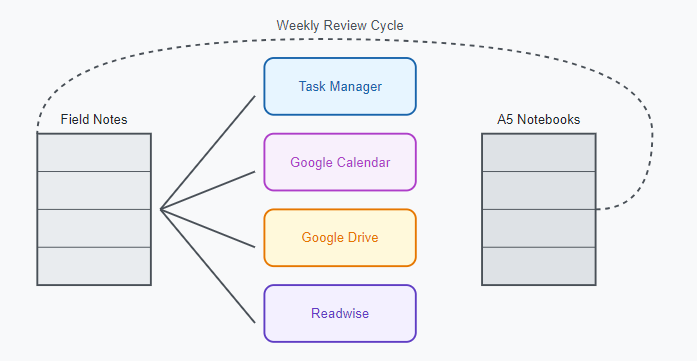Notes on Forgetting (and Remembering)
On digital hoarding, memory training, and finding the sweet spot between remembering everything and storing nothing
Like many of us working in the digital age, I've been wrestling with a challenge: how do I manage the constant flow of information in my life? Should I try to remember everything? Store everything? And when should I reach for my phone versus my trusty notebook?
I've been particularly intrigued by two contrasting approaches. On one side, there's Tiago Forte's "Second Brain" methodology, which suggests building an external system to store and organize everything. On the other, there's Cal Newport's advocacy for deep internalization and understanding. Let me share what I've discovered while trying to navigate between these two perspectives.
The Appeal of the Second Brain
Forte's approach really resonated with me at first. The idea of having a perfect digital system where I could store everything and find it instantly? Yes, please! Who hasn't dreamed of having a flawless memory? Some research suggests our brains naturally look for ways to outsource memory work - just think about how quickly we reach for our phones to look something up.
But here's where I started noticing something interesting: the more I relied on my digital storage, the less I seemed to actually remember. It reminded me of driving somewhere with GPS versus actually learning the route. Sure, GPS is incredibly convenient, but there's something different about knowing the way yourself.
The Case for Deep Learning
This is where Newport's ideas started making more sense to me. He talks about the importance of really understanding things, not just storing them. And I've noticed this in my own work - there's a huge difference between having information stored somewhere and having it readily available in my mind when I need it.
I've found internalized knowledge to be extremely powerful. It allows you to make connections between seemingly disparate ideas in your head (ironically, not dissimilar to what LLMs do).
My Current (Always Evolving) Approach
After some experimentation, I've found myself gravitating toward a mixed approach that starts with universal capture:
Everything - and I mean everything - first gets captured in my pocket-sized Field Notes notebook. Ideas, tasks, events, random thoughts, meeting notes - they all start here. If I happen to not have my notebook handy (rare, but it happens), I'll take a quick note or voice memo on my phone. In addition to this capture notebook, I maintain A5 notebooks for each area of my life: work, business, learning, podcast, and volunteering. These larger notebooks are where I do deeper thinking and planning for each domain.
When I'm trying to really understand something, I'll outline my thoughts in a new page in my notebook. There's something about the physical act of writing that helps me think more clearly.
Where Everything Goes
Here's where it gets interesting. While everything starts in my notebook, different types of information end up in different places:
Tasks → Digital Task Manager
These are actionable items that need to get done. Whether it's "buy milk" or "write blog post about knowledge management," they go straight into my task manager where I can prioritize and track them.Events → Digital Calendar
Any time-bound commitments get transferred to my calendar. This includes not just meetings and appointments, but also deadlines and important reminders. I honestly don’t know how anyone managed before digital calendars.Important Information → Google Drive
This is for information I want to keep and potentially reference later: meeting summaries, project plans, personal tax documents, home renovation notes, travel itineraries, recipes I've refined, workout programs, and documentation of processes I've created.Reading Notes → Readwise/Reader
All my reading lives in Readwise Reader - articles I save from the web, newsletters, and even tweets and YouTube videos. When I'm reading physical books, I snap photos of important passages with the Readwise app, and my Kindle highlights sync automatically too. The magic happens when Readwise automatically organizes and syncs all these highlights across formats. It's become my external reading memory, making it easy to find that perfect quote or insight when I need it.Everything Else → Stays in the Notebook
Brainstorming sessions, meeting notes, and random thoughts stay in my notebook unless they generate something that fits into one of the categories above.
The key is that nothing stays in digital limbo - every piece of information either has a clear digital home or remains in my notebook as part of my thinking process.
The Tools Question
I've noticed each type of tool has its own sweet spot:
Digital tools shine for:
Finding things quickly (ctrl+F is basically magic)
Sharing with others
Handling lots of information
Backing up (no coffee stain disasters!)
Paper works better for:
Initial thinking
Making connections
Learning new concepts
Those times when I need to focus without notifications popping up
The Weekly Review: Making It All Work
One lesson I've learned the hard way: having great capture tools isn't enough. Without regular review, even the best system becomes a digital graveyard of forgotten notes and untapped insights.
Every Sunday, I spend about an hour going through:
Any loose notes in my Field Notes notebook that need processing
My domain-specific A5 notebooks (work, business, learning, podcast, volunteering) to review progress and identify next actions that I haven’t already captured
Voice memos or quick notes from my phone
My Readwise highlights from the week
Task manager and calendar to plan the week ahead
This isn't just about organizing - it's about reflection and connection-making. Some of my best insights come from these weekly reviews, when I can step back and see patterns in what I've been thinking about and learning.
What I'm Still Figuring Out
I'll be honest - I'm still experimenting with this system. Some questions I'm wrestling with:
How do I decide what's worth storing versus what's worth memorizing?
When should I trust my memory versus my digital system?
How do I balance the convenience of digital tools with the benefits of analog ones?
What's the right frequency for reviewing and cleaning out my systems?
Your Turn
I'm really curious about how others handle this balance. What's your approach to managing knowledge? Have you found yourself leaning more toward digital storage or deep learning? What tools and techniques have you found most helpful?
Let's turn this into a conversation - share your experiences in the comments. I have a feeling we all have something to learn from each other on this journey.



